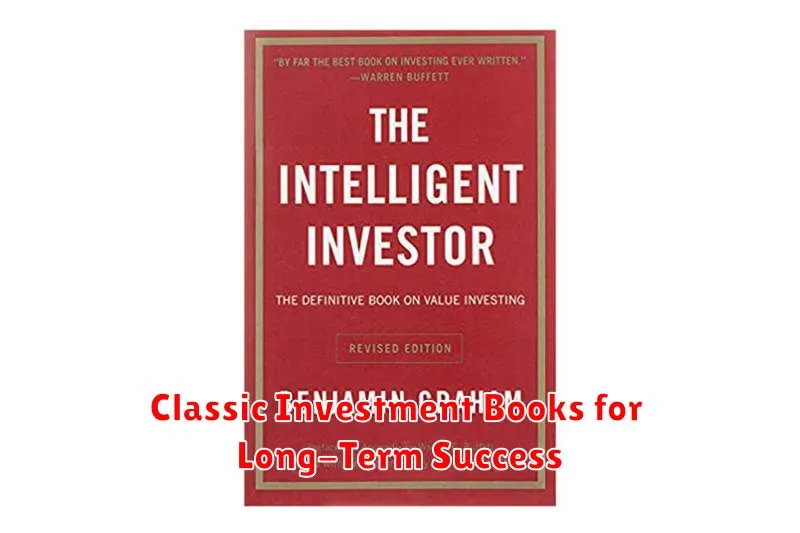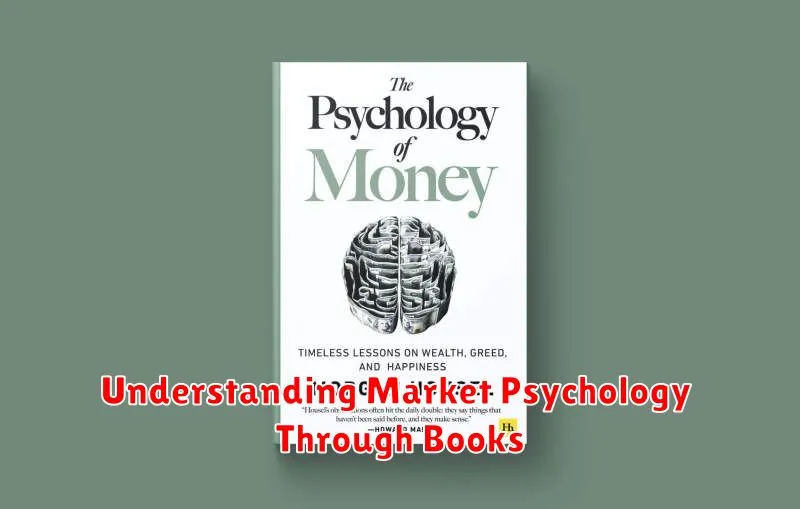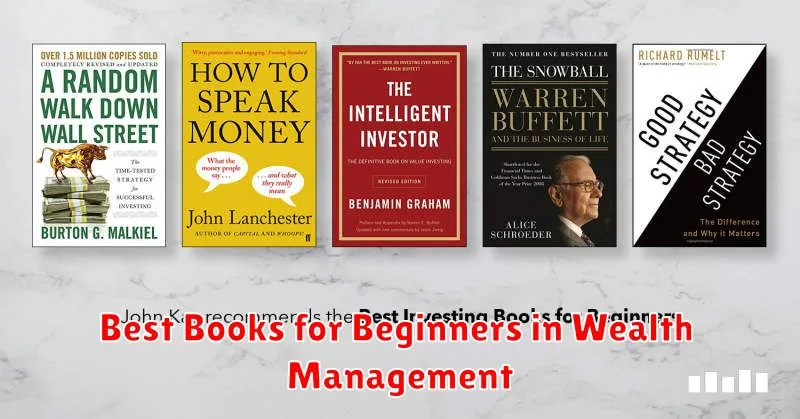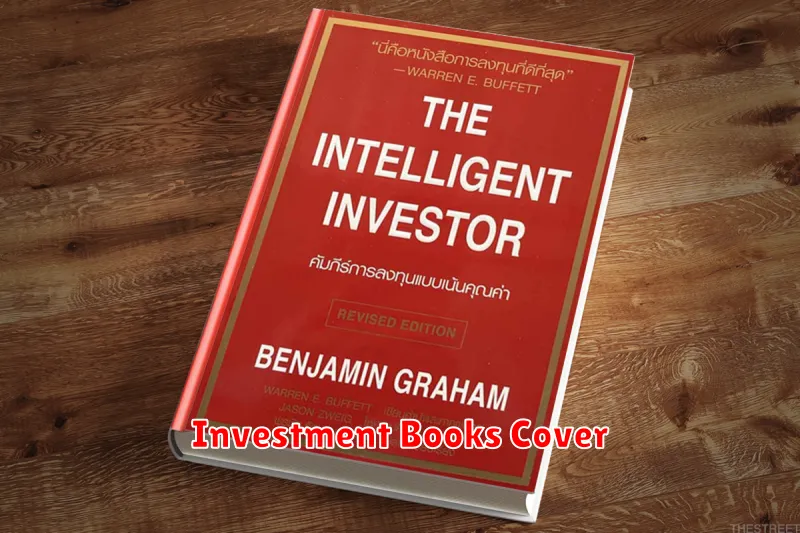Are you looking to build wealth through investing, but feel overwhelmed by the sheer amount of information out there? Finding the right books to guide you on your journey can be a game-changer. From learning the basics of investing to mastering advanced strategies, there are numerous resources available to help you navigate the financial world and achieve your goals. This article will highlight some of the best books on investing for wealth management success, covering a range of topics and writing styles to suit different learning preferences.
Whether you’re a complete beginner or an experienced investor looking to expand your knowledge, these books offer valuable insights, practical advice, and a strong foundation for building a successful investment portfolio. They delve into diverse aspects of investing, including stock selection, asset allocation, market analysis, risk management, and behavioral finance. By learning from the best in the field, you can gain the knowledge and confidence to make informed investment decisions and ultimately achieve your financial goals.
The Importance of Reading for Investment Knowledge
In the realm of finance, knowledge is power. And for investors, that power comes from a well-stocked library of financial literacy. Reading is an essential tool for acquiring the knowledge needed to make informed investment decisions. It provides access to a vast pool of information, insights, and strategies from experienced professionals, market analysts, and renowned authors.
Reading helps you understand the intricacies of the financial markets. You can learn about different investment vehicles, asset classes, and their respective risks and rewards. From the basics of stock valuation to advanced concepts like derivatives and portfolio management, reading exposes you to the intricacies of the financial world.
One of the most significant benefits of reading is its ability to broaden your perspective. By immersing yourself in diverse financial narratives, you encounter different viewpoints and investment philosophies. This exposure helps you develop your own investment style and identify opportunities that align with your risk tolerance and goals.
Beyond technical knowledge, reading cultivates essential skills for successful investing. It hones your analytical abilities, sharpens your critical thinking, and enhances your decision-making process. By analyzing financial data, interpreting market trends, and evaluating investment strategies, you become a more informed and discerning investor.
Moreover, reading keeps you updated on current market trends and events. The financial landscape is constantly evolving, with new technologies, regulations, and economic forces emerging. By staying informed through regular reading, you can adapt your investment strategies to changing market conditions and capitalize on emerging opportunities.
In conclusion, reading is an invaluable asset for any investor. It equips you with the knowledge, skills, and insights necessary to make sound financial decisions. By cultivating a habit of reading, you empower yourself with the tools to navigate the complex world of investments and achieve your financial goals.
Key Concepts Covered in Top Investing Books
The world of investing can be daunting, but it doesn’t have to be. There are countless resources available to help you navigate the complexities of the market and make informed decisions. Among these resources, investing books stand out as invaluable guides, offering insights and strategies from seasoned professionals. Whether you’re a beginner or a seasoned investor, these books provide a solid foundation for success.
Understanding the Basics
Many top investing books cover fundamental concepts that form the bedrock of sound investment practices. These include:
- Asset Allocation: This refers to the process of dividing your investment portfolio across different asset classes, such as stocks, bonds, real estate, and commodities. A well-diversified portfolio reduces risk and enhances returns over the long term.
- Risk Management: Every investment carries an element of risk. Learning how to assess and manage risk is crucial to protect your capital and achieve your financial goals.
- Market Cycles: The market moves in cycles, experiencing periods of growth and decline. Understanding these cycles can help you make strategic investment decisions.
- Valuation: This involves determining the intrinsic value of an investment, which is essential for making informed buy and sell decisions.
Investment Strategies
Top investing books often explore various investment strategies, each tailored to different risk tolerances and investment goals. Some common strategies include:
- Value Investing: This focuses on identifying undervalued stocks with strong fundamentals and holding them for the long term.
- Growth Investing: This seeks out companies with high growth potential, often in emerging industries.
- Index Investing: This involves investing in a basket of securities that track a specific market index, offering diversification and low costs.
- Active Investing: This involves actively researching and selecting individual stocks or bonds, seeking to outperform the market.
Behavioral Finance
In recent years, the field of behavioral finance has gained prominence. Top investing books often address how emotions and biases can impact investment decisions. By understanding these psychological factors, investors can minimize the impact of their own biases and make more rational choices.
Key takeaways
Investing books provide a wealth of knowledge and insights that can help you navigate the complexities of the market. By understanding the key concepts and strategies outlined in these books, you can make informed decisions, manage your risk, and achieve your investment goals.
Classic Investment Books for Long-Term Success

The world of investing can be overwhelming, especially for newcomers. With countless strategies, market fluctuations, and financial jargon, it’s easy to feel lost. However, navigating this complex landscape can be made much simpler with the guidance of classic investment books. These timeless texts, written by renowned experts, offer invaluable insights and timeless principles that can help you achieve long-term financial success.
1. The Intelligent Investor by Benjamin Graham
Often hailed as the “bible of value investing,” The Intelligent Investor by Benjamin Graham is a must-read for any serious investor. Graham, the father of value investing, emphasizes the importance of buying undervalued assets and holding them for the long term. This book provides a comprehensive framework for analyzing companies, understanding market cycles, and making sound investment decisions.
2. Security Analysis by Benjamin Graham and David Dodd
Another essential work by Benjamin Graham, Security Analysis, delves deeper into the practical aspects of value investing. Written with David Dodd, this book provides a detailed methodology for analyzing individual securities, focusing on intrinsic value and financial ratios.
3. One Up On Wall Street by Peter Lynch
Peter Lynch, a legendary mutual fund manager, shares his secrets to success in One Up On Wall Street. He emphasizes the importance of investing in what you know, identifying undervalued companies, and focusing on growth potential. This book is particularly helpful for individual investors who want to find hidden gems in the market.
4. The Little Book of Common Sense Investing by John C. Bogle
John C. Bogle, the founder of Vanguard, offers a simple and straightforward approach to investing in The Little Book of Common Sense Investing. He advocates for low-cost index funds and a long-term investment horizon, emphasizing the power of passive investing. This book is perfect for those who want to build wealth without overcomplicating their investment strategy.
5. The Essays of Warren Buffett by Warren Buffett
For a direct glimpse into the mind of one of the most successful investors of all time, look no further than The Essays of Warren Buffett. In this collection of letters to Berkshire Hathaway shareholders, Buffett shares his investment philosophy, key principles, and lessons learned over decades. This book is a treasure trove of wisdom from a master investor.
6. You Can Be a Stock Market Genius by Joel Greenblatt
Joel Greenblatt, a successful hedge fund manager, demystifies the world of investing in You Can Be a Stock Market Genius. He introduces several innovative strategies, including “magic formulas” and “special situations,” for identifying undervalued companies and generating alpha. This book is a valuable resource for investors seeking to unlock hidden opportunities.
Reading these classic investment books can provide a strong foundation for your investment journey. They offer timeless wisdom, proven strategies, and valuable insights from some of the world’s most successful investors. Remember, successful investing is a marathon, not a sprint, and these books can guide you towards long-term financial success.
Books That Teach Value Investing Strategies
Value investing is a long-term investment strategy that focuses on buying undervalued stocks and holding them for the long term. Value investors believe that the market often misprices stocks, and they seek to capitalize on these mispricings by buying stocks that are trading below their intrinsic value.
There are many books that can teach you about value investing. Here are a few of the best:
The Intelligent Investor by Benjamin Graham
This book is considered the bible of value investing. It was first published in 1949 and has been updated several times. The Intelligent Investor teaches the fundamentals of value investing, including how to identify undervalued stocks, how to calculate intrinsic value, and how to create a margin of safety. Graham also emphasizes the importance of investing in companies with strong fundamentals and avoiding speculative investments.
Security Analysis by Benjamin Graham and David Dodd
This book is a more technical and academic book than The Intelligent Investor. It delves deeper into the concepts of value investing and provides a comprehensive framework for analyzing companies and stocks. Security Analysis is an excellent resource for serious investors who want to learn the ins and outs of value investing.
You Can Be a Stock Market Genius by Joel Greenblatt
You Can Be a Stock Market Genius is a more accessible and engaging book than The Intelligent Investor. Greenblatt provides a variety of practical strategies for finding undervalued stocks, including how to use special situations, spin-offs, and other market inefficiencies to your advantage.
One Up On Wall Street by Peter Lynch
One Up On Wall Street is a classic book that teaches you how to invest like Peter Lynch, one of the most successful mutual fund managers of all time. Lynch emphasizes the importance of investing in companies that you understand and that have a competitive advantage. He also provides practical tips for finding undervalued stocks and avoiding common investment mistakes.
The Little Book That Beats the Market by Joel Greenblatt
The Little Book That Beats the Market is a concise and easy-to-read book that provides a simple strategy for beating the market. Greenblatt argues that investors can achieve superior returns by focusing on companies with high returns on capital and low price-to-earnings ratios.
These are just a few of the many excellent books that can teach you about value investing. If you are interested in learning more about this investment strategy, I encourage you to read some of these books. You may find that value investing is a great way to build long-term wealth.
Understanding Market Psychology Through Books

The stock market is a complex beast, driven not only by fundamentals but also by the emotions and biases of the investors participating in it. Understanding the psychology of market participants can give you a significant edge in your investment journey. Luckily, there are numerous books written by experts that can provide valuable insights into market psychology. In this article, we’ll delve into some of the must-read books that can help you navigate the world of market sentiment and improve your investment decision-making.
1. “Thinking, Fast and Slow” by Daniel Kahneman
This seminal work by Nobel Prize winner Daniel Kahneman explores the two systems of thinking that govern our decision-making: System 1, which is fast, intuitive, and emotional, and System 2, which is slow, deliberate, and rational. Kahneman’s insights into cognitive biases, such as anchoring, framing, and the availability heuristic, are essential for understanding how investors make decisions, both rational and irrational.
2. “Extraordinary Popular Delusions and the Madness of Crowds” by Charles Mackay
This classic book, originally published in 1841, examines historical instances of collective mania and irrational behavior in financial markets. Mackay’s analysis of “tulip mania,” the South Sea bubble, and other historical bubbles offers valuable lessons about the dangers of herd mentality and the importance of independent thinking in investing.
3. “The Psychology of Investing” by John C. Bogle
John C. Bogle, the founder of Vanguard Group, provides practical advice on how to avoid the common pitfalls of investing, such as overtrading, chasing returns, and succumbing to market sentiment. He emphasizes the importance of long-term investing, low-cost index funds, and behavioral discipline in achieving financial success.
4. “The Little Book of Behavioral Investing” by James Montier
This accessible and insightful book delves into the psychology behind investment decisions, covering topics such as cognitive biases, market bubbles, and behavioral finance. Montier provides practical tips and strategies for investors looking to improve their decision-making and avoid common mistakes.
5. “The Intelligent Investor” by Benjamin Graham
While not solely focused on market psychology, this timeless book by the father of value investing emphasizes the importance of understanding market sentiment and avoiding emotional decisions. Graham’s principles of value investing encourage investors to focus on fundamentals and make rational decisions based on intrinsic value, rather than succumbing to market hype.
Reading these books can help you gain a deeper understanding of how market psychology impacts investment decisions. By recognizing your own cognitive biases and learning to manage your emotions, you can make more informed and profitable investment choices.
Books Focused on Growth Investing and Innovation
The world of investing is vast and complex, but there are certain areas that have consistently proven to be profitable over time. One such area is growth investing, which focuses on identifying companies with high growth potential. These companies often operate in innovative industries and are characterized by their ability to disrupt existing markets. If you’re interested in learning more about growth investing and innovation, here are some essential books that can provide you with valuable insights.
Investing in Innovation: How to Make Money from the World’s Most Disruptive Trends
In this book, Clayton Christensen, a renowned expert on disruptive innovation, explores the principles of identifying and investing in companies that are revolutionizing their industries. He provides a framework for understanding how innovation works and how investors can capitalize on its potential. The book delves into various examples of successful and failed innovation, offering valuable lessons for navigating the ever-evolving technological landscape.
The Innovator’s Dilemma: When New Technologies Cause Great Firms to Fail
Another groundbreaking work by Clayton Christensen, “The Innovator’s Dilemma” delves into the challenges faced by established companies when confronted with disruptive technologies. It explains why successful companies often struggle to adapt to change and how they can avoid the pitfalls of innovation. This book provides a critical lens for understanding the dynamics of innovation and its impact on the market, offering insights that can help investors identify growth opportunities and avoid potential risks.
The Outsiders: Eight Unconventional CEOs and Their Radically Successful Strategies
In this book, William Thorndike explores the leadership strategies of eight unconventional CEOs who defied industry norms and achieved remarkable success. The book focuses on their ability to identify and exploit growth opportunities, often through acquisitions and strategic investments. It offers valuable lessons in leadership, decision-making, and capital allocation, providing investors with insights into the mindset of successful growth investors.
The Alchemy of Finance: Reading the Mind of the Market
This classic work by George Soros offers a unique perspective on financial markets and the role of investor psychology in driving market trends. Soros, a renowned hedge fund manager, argues that markets are not always rational and that understanding investor sentiment is crucial for successful investing. The book delves into the concept of reflexivity, where investor expectations can influence market outcomes, providing valuable insights into the dynamics of market behavior and the potential for growth investing.
The Intelligent Investor: The Definitive Book on Value Investing
While not solely focused on growth investing, Benjamin Graham’s “The Intelligent Investor” is a foundational text for any investor. It emphasizes the importance of value investing, which involves identifying undervalued companies with strong fundamentals and long-term growth potential. The book provides timeless principles for navigating the market and making sound investment decisions, which can be applied to both value and growth investing.
These books offer a comprehensive framework for understanding the principles of growth investing and innovation. They provide insights into the dynamics of disruptive technologies, the challenges faced by established companies, and the importance of identifying and investing in companies with high growth potential. By incorporating these concepts into your investment approach, you can position yourself to capitalize on the opportunities presented by the ever-evolving world of innovation.
Best Books for Beginners in Wealth Management

Wealth management is a complex and multifaceted field, but it’s also a crucial one for anyone who wants to secure their financial future. Whether you’re just starting out in your career, are nearing retirement, or simply want to learn more about managing your finances, there are plenty of resources available to help you get started. One of the best ways to gain knowledge and insight is by reading books written by experts in the field.
If you’re a beginner in wealth management, it can be overwhelming to know where to start. To help you navigate this journey, we’ve compiled a list of the best books that can guide you through the fundamentals and equip you with the knowledge to make informed financial decisions. These books cover a wide range of topics, from budgeting and saving to investing and retirement planning.
Essential Reads for Beginners
Here are some highly recommended books that are perfect for beginners looking to dive into the world of wealth management:
- “The Total Money Makeover: Classic Edition” by Dave Ramsey: This classic guide offers a no-nonsense approach to managing your money, emphasizing debt elimination, budgeting, and building an emergency fund.
- “Rich Dad Poor Dad” by Robert Kiyosaki: This best-selling book challenges conventional financial wisdom and encourages readers to think differently about money, investments, and building wealth.
- “The Millionaire Next Door” by Thomas J. Stanley and William D. Danko: This book explores the habits and mindsets of affluent individuals, providing insights into how they achieved financial success.
- “The Automatic Millionaire” by David Bach: This practical guide teaches readers how to automate their finances, making saving and investing effortless.
- “Your Money or Your Life” by Vicki Robin and Joe Dominguez: This book encourages readers to reevaluate their relationship with money and make conscious choices to align their spending with their values.
These books offer valuable insights, strategies, and practical advice for anyone looking to improve their financial literacy and build a solid foundation for their future. As you delve into these resources, remember to tailor the information to your specific circumstances and goals, and don’t hesitate to seek professional financial advice when needed.
Learning from Biographies of Successful Investors
Biographies of successful investors can provide valuable insights into the strategies, mindset, and habits that contribute to financial success. By delving into the lives of legendary investors, we can gain a deeper understanding of their investment philosophies, decision-making processes, and the challenges they faced along the way.
One of the key takeaways from biographies is the importance of deep research and analysis. Investors like Warren Buffett and Charlie Munger have consistently emphasized the need to understand the fundamentals of businesses before investing. They spend countless hours researching companies, studying their financials, and evaluating their competitive advantages.
Another common theme is the importance of patience and discipline. Successful investors don’t chase quick gains or panic during market downturns. They have a long-term perspective and are willing to wait for the right opportunities to arise. This requires a strong emotional intelligence and the ability to resist market noise.
Biographies also highlight the role of adaptability and continuous learning. Investors who have achieved sustained success are always looking for new ways to improve their skills and stay ahead of the curve. They adapt to changing market conditions, embrace new technologies, and continuously seek out knowledge from diverse sources.
By studying the lives of successful investors, we can gain a deeper understanding of the principles and practices that contribute to financial success. These biographies offer valuable lessons on the importance of research, patience, discipline, and a lifelong commitment to learning.
Staying Updated with Current Investment Trends
In today’s dynamic financial landscape, staying abreast of current investment trends is crucial for investors of all levels. The market is constantly evolving, driven by factors such as technological advancements, economic shifts, and geopolitical events. To make informed investment decisions, it’s essential to have a firm grasp on the prevailing trends shaping the investment landscape.
One of the most prominent investment trends in recent years has been the rise of sustainable investing. Investors are increasingly seeking to align their portfolios with their values by investing in companies that prioritize environmental, social, and governance (ESG) factors. Sustainable investing encompasses a wide range of approaches, from investing in renewable energy companies to supporting businesses with strong labor practices.
Another significant trend is the growing popularity of alternative investments. Traditionally, investors have focused on stocks and bonds. However, the demand for alternative investments, such as real estate, private equity, and commodities, has been on the rise. These assets can offer diversification benefits and potentially higher returns, but they also come with greater risks.
The rise of artificial intelligence (AI) is transforming the investment industry. AI-powered tools are being used to analyze vast amounts of data, identify patterns, and generate investment recommendations. While AI can enhance investment decision-making, it’s crucial to understand its limitations and use it responsibly.
To stay informed about current investment trends, investors can leverage a variety of resources. Financial news websites, industry publications, and investment research firms provide insights and analysis. Attending industry conferences and workshops can also be valuable for networking and gaining knowledge from experts.
By actively seeking out information and understanding the prevailing investment trends, investors can position themselves to make informed decisions and navigate the ever-changing market landscape effectively.

